Blood Brothers (a.k.a. Dynasty
of Blood)
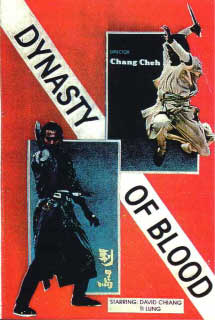
Reviewed by Yves Gendron
A trio of sworn-friends find their fortune in
a land rife with trouble and civil strife with one of them eventually committing
a betrayal, an act leading to death and revenge. This is of course the rough
synopsis of A BULLET IN THE HEAD widely seen as John Woo’s masterpiece, his
most personal movie and one of the most harrowing pieces of film ever made.
Yet this is also the story of BLOOD BROTHERS (a.k.a. DYNASTY OF BLOOD), a
seventies martial-art yarn by the genre grand master filmmaker Chang Cheh,
where Woo happened to work as an assistant- director and reportedly was inspired
by this film for his later Vietnam epic. It starred the three great Shaw
Brother studio martial stars of the time: Ti Lung, David Chiang and Chen
Kuan-Tai.
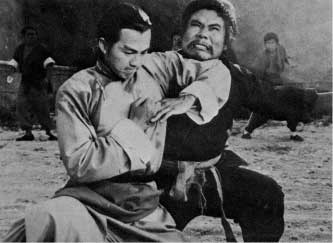
An up and coming Quin dynasty provincial governor Ma Hsin I has being assassinated
in full view. At the trial the assassin Chang Wan Hsing (David Chiang)
freely offers his confession and tells the story of his relationship with
Ma and the events that led him to do this murderous deed. Chang and his sworn-brother
Huang Chung (Chen Kuan Tai) were highwaymen who confronted an oncoming rider,
Ma (Ti Lung), to rob him. Instead, through his remarkable fighting skills,
his bravery, the sheer force of his personality and his promise of a great
future if they joined him, they all became sworn-brothers. The trio then
challenged the Mountain bandits and upon becoming their leader Ma builds
them into a potent fighting force. Once that is done, the ambitious and single-minded
Ma leaves to attend a state-sponsored military examination in order to become
a high ranking officer with the regular army and also to get away from Mi-lan
(Chang Lien) Huang Chung’s beautiful wife with whom he has become smitten
with feelings which are reciprocated. A couple of years later Ma has succeed
in his aim and become an up-and coming general. He calls back his brothers
and their men to wage a successful campaign against rebels. If anything, time
has only intensified the feelings between Ma and Mi-lan, but their love is
forbidden as she is the wife of his sworn-brother, leading the ruthless Ma
to take a fateful decision that will have dire consequences for all involved.
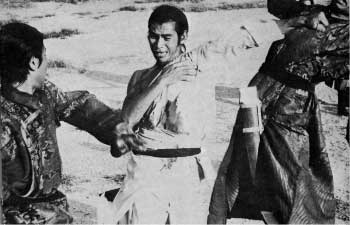
“ASSASSINATING MA” (the Chinese actual title) is based on an actual
mid-nineteenth century Quin dynasty case which became the subject of many
notorious accounts either in literary fiction, political essays or Chinese
opera and was adapted several times for the screen - most notably in 1929
and 1949. Common wisdom has always depicted Ma and the unfaithful wife as
being truly despicable, reviled characters with the woman coming across as
little more than a cheap woman lacking in morals. Chang Cheh though had others
ideas for his version and made it into a star- crossed tragic love story.
By casting Ti Lung and the beautiful actress Chang Lien in the lead roles,
ones that others thought more suited for an absolutely evil looking actor
and a porn actress (for nude scenes of course) Cheh changed the mood and
direction of the film. In this reviewer’s opinion, the love story - displayed
in coy yet somewhat theatrical fashion - is actually the best realized aspect
of this movie and the scenes of Lung and his leading lady are quite touching
as the viewer can clearly see the desire, joy, pain and guilt that both of
them have. We sympathise all the more with the wife’s plight as her husband
Chen Kuan Tai is truly something of an innocent oaf who neglects his spouse
and spends his time with either his buddy David Chiang or whoring and drinking
with courtesans. Ti Lung's cast against type performance is commendable in
this movie, as he leaves behind his days of young impetuous bare-chested
fighter to play a much darker and commanding character, ruthless and single-minded
yet sensitive to one woman’s beauty and love and he quite suffers for it.
He had at long last come of age as an actor and the film really clinched
his popularity.
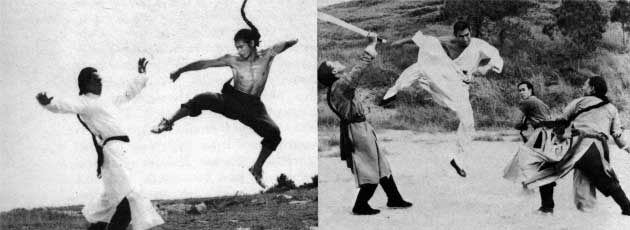
Others aspects of the film are not so well realized however. Chang Cheh had
established much of his repute with the intense bonding between his male
characters. Surprisingly though, in BLOOD BROTHERS precious little time and
effort is really spent on establishing and cultivating the close bond the
sworn-brothers are suppose to have between them; at least when compared to
some of his earlier movies. If David Chiang and Chen Kuan Tai act as
the best of buddies, Ti Lung always remains aloof and remote and seems to
establish no true bond with the other two. Clearly, Chang Cheh’s focus
was with the love story but his neglect of the male bonding theme undermines
some of the film’s dramatic soundness. Further for the sake of narrative
simplicity, Chang has given a flashback structure to the film. It’s David
Chiang who recalls in his confession his history with Ma and what led him
to kill him. It’s a nice idea but with a serious flaw in its logic. Indeed
if it is Chiang’s tale, then where do the entire intimate scenes between
Ma and Huang’s wife come from. Besides, the plight of the star-crossed couple
is shown with sympathy, but Chiang has no sympathy whatsoever for them. As
soon as he found out, he called the wife a bitch and Ma a betrayer. It is
something of a minor quibble which truly does not affect or diminish the
film overall, but it remains a very obvious flaw regardless
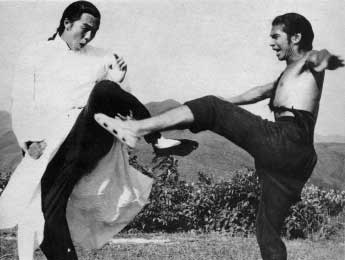
Backed by Shaw Brother resources and Chang Cheh’s skills, BLOOD BROTHERS
is an expectedly well crafted movie with good production values and a classy
look. Time though has not been kind to it as poor preservation and bad English
dubbing have given it something of a stale even hokey look to it. As this
is a martial art-movie and not a period piece, there is plenty of fighting
that is reasonably well set within the tragic tale. The fight choreography
is okay. It’s of the realistic variety with intricate moves by the performers
although by contemporary standards they look a bit slow and tame. Most of
it is shot outdoors and in wide-shot, which allows one to see the actors
perform their own moves but the camera's distance somewhat diminishes the
intensity. Martial art fighting works best in in-door settings and
with medium shots, and as a matter of fact the most compelling fight scene
is the one between Chiang and Ti Lung which is precisely done in that fashion.
Occasional slow-motion, gives some gripping moments to the Chiang/Ti Lung
final showdown but otherwise viewers might find their out-doors ultimate
encounter perhaps lacking.
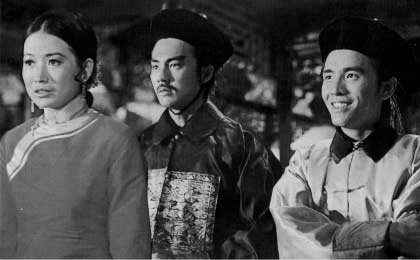
Bey Logan in his Hong-Kong Action Cinema book has called BLOOD BROTHERS “innovative”,
perhaps because it was the first Shaw Brothers movie to tackle the Qin Dynasty
period. This was deemed a taboo era in filmmaking because Chinese people
were subjugated by foreign Manchurian rule and forced to wear the pigtail
hairstyle as a sign of submission to their ruler. In time, the pigtail had
become a despised mark of infamy for many Chinese especially those living
abroad in South East Asia. As the region was the main market for Shaw Brothers
films it was deemed therefore commercially non-viable to do a movie set during
this despised period. Further Run Run Shaw, the Shaw studio chairman, was
himself dead set against “pigtail” movies for the same reason. Somehow, Chang
Cheh convinced Shaw to change their policy, a decision which in the end paid-off
as BLOOD BROTHERS ended-up being ranked 10th at the box-office for that year,
the highest for a Shaw martial movie. The following years started the Qin
era set Shaolin Kung-fu sub-genre pioneered once again by Chang Cheh, and
the once taboo period became kung fu’s new movie setting of choice. Star
viewers beware; the film sports a brief early appearance by “born a cop”
actor Danny Lee, wearing a longhaired wig and using a spear as a rebel fighter.
It’s an undistinguished appearance where the future “inspector Lee” is barely
recognisable, only really noticeable for the goofy way he tumbles down when
struck dead.
In its current poor dubbed video form, BLOOD BROTHERS
is a tentative recommendation. Yet despite this and other flaws, it remains
quite worthwhile for its drama and also for Ti Lung’s against type role.
After all it’s not everyday you see a usual good guy playing the villain.
Also, let’s not forget that it serves as template for one of John Woo best
movies.
My rating for this film: 7.0






